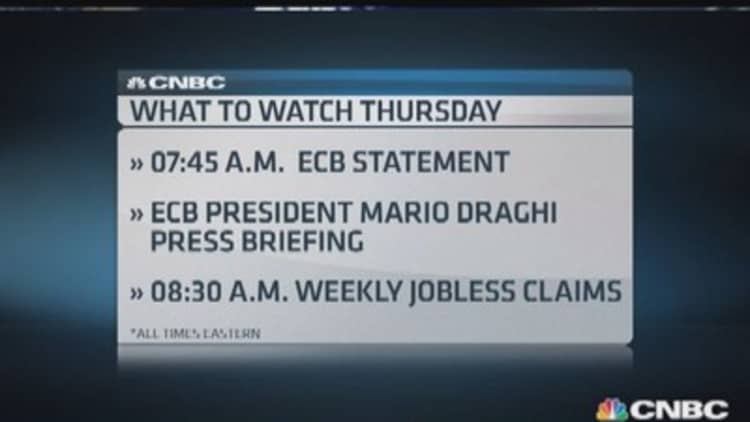
Europe could again have a grip on global markets Thursday, as the European Central Bank holds its rates meeting.
Although the ECB is not expected to take action, ECB President Mario Draghi will hold a press briefing and will have an opportunity to comment on new signs of weakness in the euro zone and the geopolitical risks that threaten its economy.
Unlike the Fed, accused of being easy for too long, the ECB's critics say it is too slow to move with more stimulus as Europe deteriorates.
On Wednesday, Italy reported that it was in a recession with two quarters of contraction, and Germany, the engine of the euro zone economy, reported a sharp drop in factory orders. The weaker data follows last week's shock report of lower inflation.
Equities markets shook off the worst of their losses Wednesday, but not before the German DAX tumbled to a level more than 10 percent below its June 30 high. Strategists have been watching the rapid decline of the German market, as a warning of sorts for U.S. stocks.
Read MoreUS GDP growth now even higher after trade gap data
Wall Street, meanwhile, closed little changed Wednesday. The was virtually flat at 1,920, and the Dow was up 13 points at 16,443, after a day of ups and downs in a relatively tight range. The bond market, however, has been a bit more dramatic move.
The 10-year Treasury yield fell to 2.433 percent at its low point, tracking lower with the German bund in a flight-to-safety move. The 10-year bund hit a record low yield of 1.09 percent, and the U.S. 10-year yield later recovered to 2.46 percent in late trading.
"The ECB eased a few months ago, and we just haven't seen the light at the end of the tunnel," said Justin Lederer, Cantor Fitzgerald interest rate strategist. At its June 5 meeting, the ECB announced for the first time a negative rate on bank deposits held at the ECB, and it also said it would offer four-year loans to banks starting in September on the condition they pump the money into the private sector. Draghi said he hoped the ECB easing measures would help drive inflation, but so far inflation has been below expectations and there are fears of deflation.
Europe has been hanging over U.S. markets, both from an economic standpoint and as it faces off against Russia over Ukraine. Stocks sold off Tuesday on concerns Russia could move its 20,000 troops near the border into Ukraine to help pro-Russia rebels.
Lederer noted the swift swing in market sentiment in the U.S. in the past week. "On Wednesday of last week, we were making new highs in the 2s and 3s (Treasury yields). The curve was flattening and people were preparing for Fed tightening, sooner rather than later. It didn't take much for the market to turn around."
Read MoreWall Street's top bull: Correction's end 'very close'
Stocks started Wednesday on weak footing but improved, and bond yields also rose. "A lot of it was also positioning. There was a big short base in the front end preparing for the Fed. Some of those shorts have been covered," Lederer said.
Boris Schlossberg, managing director at BK Asset Management, said the ECB will be watching to see the impact of its recent moves before taking further actions.
"The data has deteriorated because of all this fear over the Ukraine crisis. The interesting thing will be if the ECB acknowledges a precipitous drop in sentiment or if (Draghi) just shakes it off," Schlossberg said. "It's clear their problems are more severe than anybody thought they would be at this point. They were looking for a recovery and uptick in growth, and what we're seeing is a collapse in growth and pretty serious decline in growth. The story in Russia is going to hurt Germany and that's going to hurt the euro zone."
Read MoreHere's why I'm still shorting this market: Insana
On Wednesday, Russia further elaborated on its plans to retaliate against the countries that have sanctioned it. It said it would end some agricultural imports and put a ban on U.S. poultry imports.
John Stoltzfus, chief market strategist at Oppenheimer Asset Management, said geopolitical events are the biggest risk for stocks. He said the market could be choppy, but he's still positive. He said the two high-profile potential mergers that dissolved this week should not be a concern for markets. Twenty-First Century Fox gave up its pursuit of Time Warner, and Sprint, facing regulatory hurdles, dropped its pursuit of T-Mobile.
"I just think the leadership of the activist investors…it's just another indicator of the health of the markets and the economy. If M and A is active and the activists are active, it's a sign of life," he said.
Besides the ECB Thursday, the Bank of England holds a rates meeting and some strategists expect it to sound much more hawkish than the ECB, possibly alluding to a path toward normalcy, o rate hikes.
There is some U.S. data Thursday, including weekly jobless claims at 8:30 a.m. ET and consumer credit at 3 p.m. Chain stores release monthly sales reports during the day, and there are some earnings expected including Wendy's, Mylan Labs, AMC Networks, NRG Energy, Duke Energy, Brinker International, Intercontinental Exchange, Scripps Networks, Orbitz and Whitewave Foods. Zynga, News Corp, CBS, Solar City and Nvidia report after the close.
—By CNBC's Patti Domm


